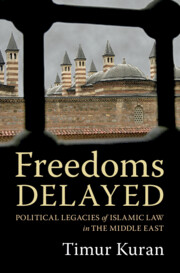Book contents
- Freedoms Delayed
- Freedoms Delayed
- Copyright page
- Dedication
- Contents
- Figures
- Tables
- Preface
- Part I The Modern Middle East’s Authoritarian Face
- Part II Persistent Social Atomization
- Part III Religious Repression
- 7 Religious Freedoms in Middle Eastern History
- 8 The Marginalization of Islam
- 9 The Resurgence of Assertive Islamism
- 10 Religious Diversification, in Fact and in Law
- 11 The Absence of Liberal Islamic Schisms
- Part IV Economic Hindrances
- Part V Conclusion
- Notes
- Bibliography
- Index
11 - The Absence of Liberal Islamic Schisms
from Part III - Religious Repression
Published online by Cambridge University Press: 20 July 2023
- Freedoms Delayed
- Freedoms Delayed
- Copyright page
- Dedication
- Contents
- Figures
- Tables
- Preface
- Part I The Modern Middle East’s Authoritarian Face
- Part II Persistent Social Atomization
- Part III Religious Repression
- 7 Religious Freedoms in Middle Eastern History
- 8 The Marginalization of Islam
- 9 The Resurgence of Assertive Islamism
- 10 Religious Diversification, in Fact and in Law
- 11 The Absence of Liberal Islamic Schisms
- Part IV Economic Hindrances
- Part V Conclusion
- Notes
- Bibliography
- Index
Summary
Millions of “secular Muslims” would become “practicing Muslims” if there existed a variant of Islam compatible with their values, for instance one that would broaden women’s rights and adapt rites to the rhythms of modern life. If no liberal variant has emerged, the reason is not that Islam is monolithic. As with other religions, it admits diverse interpretations. Yet over fourteen centuries, variations in interpretation have produced just one major schism: the Sunni–Shii split of 661. This is puzzling because Christianity, the other monotheism with over a billion adherents, sees schisms frequently. If the collective action necessary for a liberal schism has not materialized, a basic reason lies in obstacles to conducting honest discussions on what Islam represents. Liberal Muslims are intrinsically opposed to settling conflicts through violence, which handicaps them vis-à-vis groups prepared to charge them with physically punishable religious offenses. Easily victimized, they cannot fight back as effectively. Thus, apostasy and blasphemy rules, the two most lethal weapons of Islamic illiberalism, reproduce the fears that allow their preservation. To avoid personal trouble, liberal Muslims, atheists, non-Muslim believers, and assorted other dissenters all avoid repudiating the notion that apostasy and blasphemy are acts that require temporal punishment.
Keywords
- Type
- Chapter
- Information
- Freedoms DelayedPolitical Legacies of Islamic Law in the Middle East, pp. 190 - 210Publisher: Cambridge University PressPrint publication year: 2023

